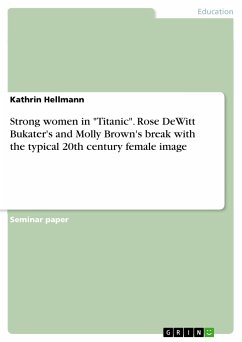Seminar paper from the year 2014 in the subject Didactics for the subject English - Literature, Works, grade: 2,0, University of Cologne (Englisches Seminar I), course: Gender Matters, language: English, abstract: On the 14th of April in 1912, just at the time of first-wave feminism, the allegedly unsinkable Titanic perished in the Atlantic Ocean after running into an iceberg at full speed. It is an event that not only bothered the people at that time, but also today. This interest today is only partly based on the tragedy itself, but also on James Cameron's screen adaptation from 1997, which is one of the most expensive ones in history. Cameron combines a catastrophe with a love story by using real and fictional characters which are formed in a way that leaves space for further interpretation. With some of his characters he also thematises the above mentioned first wave of feminism and the associated emancipation of women which is an extremely interesting topic from nowadays perspective, since equality of men and women is taken for granted in today's society. The elaboration at hand takes a closer look at the fictional character Rose Dewitt Bukater and the non-fictional character Molly Brown and her portrayal in the film. Both of them are analysed with regard to the new model of femininity they represent which runs against the common image of women of their time. Moreover it will be shown whether the two of them function as role models or even heroines for other people on the ship and in front of the silver screen. As a result there are two basic questions that this elaboration tries to answer: To what extent do Rose and Molly break with the common image of women at that time; to what extent do they not? And what is their character's function in the film? To answer this questions the first step is to give an overview about the common model of femininity in and around 1912 with a typical example given in the screen adaptation from 1997 which in this case is Rose's mother, Ruth DeWitt Bukater. It will be easier to then realize what is so striking about Rose Dewitt Bukater's and Molly Brown's behaviour. Thereafter, this behaviour will be described and analysed with regard to the expectations of women in the 19th and in the beginning of the 20th century. Furthermore, some dubious statements found during research in international literature are questioned. In the course of this the basic questions mentioned above will be answered.
Dieser Download kann aus rechtlichen Gründen nur mit Rechnungsadresse in A, B, BG, CY, CZ, D, DK, EW, E, FIN, F, GR, HR, H, IRL, I, LT, L, LR, M, NL, PL, P, R, S, SLO, SK ausgeliefert werden.









